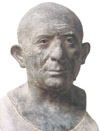
THE POLITICAL ADMINISTRATION OF POMPEII
0 V F, this was the customary abbreviation used at the end of a text of electoral propaganda painted on the walls of the town in an appeal to the electorate (oro vos faciatis - please vote for him) so that this or that candidate would be elected to one of the four posts in the town's administration.
Hustings would be held in the town every March so that the electorate could decide which candidate to vote for in the April elections of the two duumviri iure dicundo and the two aediles, who would then take up office on the first of July. The Duumviri were the town's highest ranking magistrates and were responsible for the political running of the town and the administration of justice. It was their job to ensure the implementation of the resolutions passed by what we can call the 'town council (ordo decurionum) which was made up of 100 members, elected every five years according to their status in terms Of wealth and acknowledged honours.
Lesser but nevertheless important tasks were carried out by the aediles who were responsible for organising the works and activities needed for the daily running of the town. These included organising the town market, town planning and roads, maintenance of public and religious buildings, the baths and the organisation of public games.
The Comitium, in the corner between the Forum and Via dell'Abbondanza, served as a polling station where the electorate (men only) would go during elections with their tesserula, a sort of polling card attesting to the voter's identity. Voters were required to write down the name of the chosen candidate on a waxed tablet which was then placed in the ballot box. The candidates that had attained the relative majority of votes in the most electoral constituencies would be elected. For instance, a candidate would not be elected if he got the maximum votes in just a few constituencies and no votes at all in the others. In the event of a tied vote, the winner would be chosen on the basis of whether he was married and how many children he had. The whole town took a keen interest in the election campaign, as can be seen from the many inscriptions found on the walls. Every category of workers, traders and businessmen had a steadfast commitment for taking part as well as a strong sense of civic responsibility to ensure that the worthiest candidates were elected. There must have been an almost full turn out at every election, judging from the exhortations made on the electorate district by district, house by house and shop by shop.
Be careful, be ready and get others to vote is the heartfelt appeal in one inscription; elsewhere, supporters of some candidate appeal to other voters and indicate the name of their candidate for whom they hope to gain support.
Although women did not have the right to vote, they nevertheless played a crucial role given that they had a number of influential contacts through their work or social acquaintances.
The town's life and activity was run from three Municipal Buildings found in the southern part of the Forum, while the administration of justice was carried out by the Duumviri in the Basilica.






